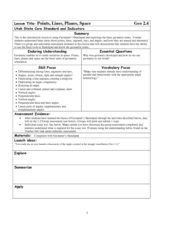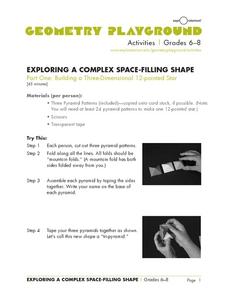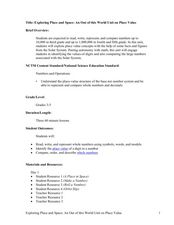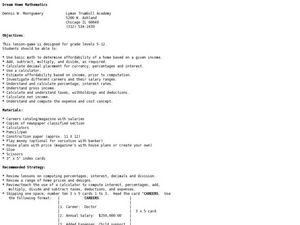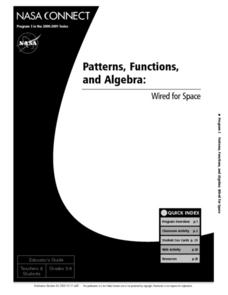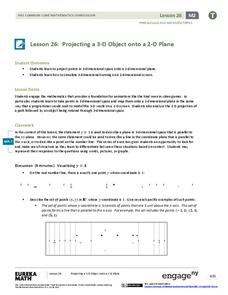Curated OER
Points, Lines, Planes, and Space
For this points, lines, planes, and space worksheet, students solve word problems dealing with points, lines, planes, and space. Students complete 20 individual problems and 20 group problems.
NASA
Lights on the International Space Station
Groups explore illumination with NASA's Lighting Environment Test Facility (LETF) as a context. Using the TI-Nspire app, groups determine the lux equation that models their simulation. They then use the lux equation to...
Curated OER
Design Space
Students will develop an understanding design space. The arrangement of shapes is taught to create simple perspective. The differences in the size of shapes is shown in order to help learners see how they should be arranged in...
Curated OER
The International Space Station
In this International Space Station learning exercise, students are given the altitude changes in the space station on a graph from 2000-2004. Students answer 5 questions about the trends in the graph, the changes in altitude, the reason...
NASA
Exploring Exoplanets with Kepler
Calculate the movement and properties of planets like professional astronomers! Scholars use Kepler's third law to find Mercury and Venus's distance from the sun. Using changes in brightness of distant stars and Kepler's third law,...
Curated OER
Functions and Statistics: International Space Station: Up to Us
Learners explore how the International Space Station was built and how it provides first-hand experiences with the space program. They view the NASA engineers discussing the major components of the International Space Station, their...
Exploratorium
Exploring a Complex Space-Filling Shape
Middle schoolers build a three-dimensional 12-pointed star as a geometric exercise. The shape is quite-difficult to construct. Luckily there is an excellent template that learners cut out, then use to make their pyramid. The second part...
Curated OER
Celebrate Mathematics Awareness Month in Your Class
Learn the history and purpose behind this month dedicated to the exploration of numbers.
EngageNY
Solving Equations Involving Linear Transformations of the Coordinate Space
Explore methods for solving linear systems with your classes and introduce learners to using matrices as a viable method. Scholars are able to recognize situations where matrices are the efficient method of solving. Application...
EngageNY
Coordinates of Points in Space
Combine vectors and matrices to describe transformations in space. Class members create visual representations of the addition of ordered pairs to discover the resulting parallelogram. They also examine the graphical representation...
Curated OER
Plasma Clouds in Space and Density
Use this plasma clouds worksheet to have learners find the density of 10 different plasma clouds using a given formula which uses the reflection frequency to determine the density.
Curated OER
Exploring Place and Space
Students explore number values by completing mathematical worksheets in class. In this decimals lesson, students identify the different place values a number has and the use of decimals to represent a fraction of a number. Students...
EngageNY
Composition of Linear Transformations 2
Scholars take transformations from the second to the third dimension as they extend their thinking of transformations to include three-dimensional figures. They explore how to use matrices to represent compositions of...
Curated OER
Dream Home Mathematics
Explore the concept of budgeting with sixth graders. They will pick a career on note card made by the teacher. They then use the information on the card such as salary, expenses, and career to create a life for themselves. They also...
Curated OER
Mathematics at the Frontier of Astronomy
Students explore the different types of measurements used in astronomy. For this space science lesson, students explain the relationship between planets' orbits and distance from the sun using Kepler's Laws. They discuss how math aides...
Curated OER
Patterns, Functions, and Algebra: Wired for Space
Young scholars assess how patterns, functions and algebra can assist NASA engineers design new ways of propelling spacecrafts. They explore how electricity and magnetism are replacing the fuel-consuming rocket propulsion....
Curated OER
Relating Space and Plane Shapes
In this mathematics worksheet, 1st graders identify which object in an illustration has a flat side the same shape as the box shown. Then they look at other shapes and identify the ones with a flat side, if any.
Curated OER
Law of Large Numbers - Hospital
Students explore concepts of probability and independent events. They develop a formula for deviation percentage.
Curated OER
Using Technology to Represent Mathematical Identities
Students explore the concept of trig identities. In this trig identity lesson plan, students use Mathematica to graph trig identities. Students see the trig identities graphically and enforce the notion that two trig functions can be...
EngageNY
Chance Experiments with Equally Likely Outcomes
Take a deeper dive into equally likely probabilities. Pupils build upon their understanding of probability by determining sample spaces and outcomes. Individuals work with sample spaces and determine outcomes that are equally likely....
EngageNY
Using Sample Data to Estimate a Population Characteristic
How many of the pupils at your school think selling soda would be a good idea? Show learners how to develop a study to answer questions like these! The instructional activity explores the meaning of a population versus a sample and how...
EngageNY
Projecting a 3-D Object onto a 2-D Plane
Teach how graphic designers can use mathematics to represent three-dimensional movement on a two-dimensional television surface. Pupils use matrices, vectors, and transformations to model rotational movement. Their exploration involves...
Curated OER
Our Solar System - Comparing Planetary Travel Distances
NASA presents a mini-unit on distances in our solar system. It incorporates scientific concepts of gravity, mass, density, and payload while your aspiring astronauts also employ mathematics skills. They calculate speed, they determine...
EngageNY
First-Person Computer Games
How do graphic designers project three-dimensional images onto two-dimensional spaces? Scholars connect their learning of matrix transformations to graphic design. They understand how to apply matrix transformations to make...
